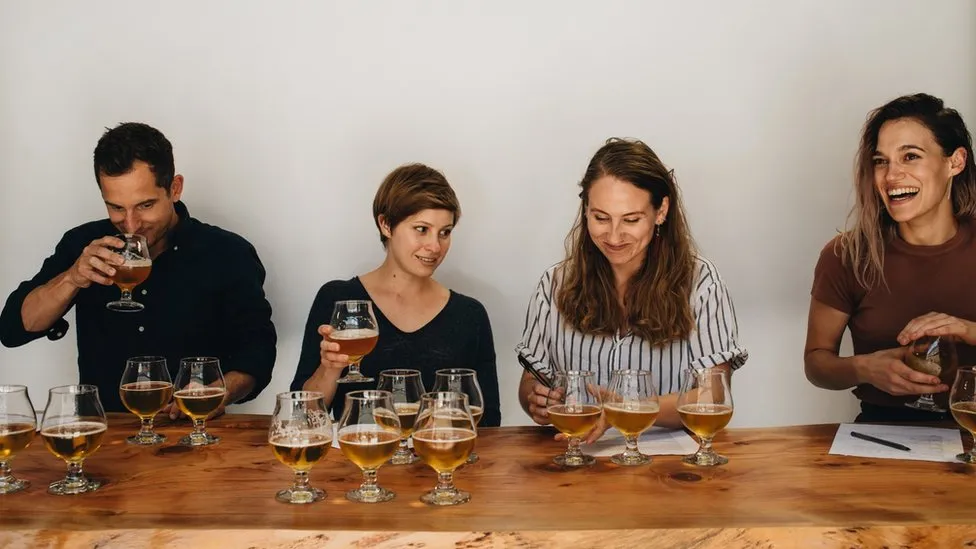Would you drink genetically modified beer?
Charles Denby says his job is simply all about trying to improve the taste of beer.

"We are interested in toggling up the desirable flavours, and toggling down not-so-great flavours, and generating new flavours."
For the millions and millions of lager and ale fans out there, these sentiments all sound great. But when you know what Mr Denby's US company actually does, things become a bit more divisive.
He is the co-founder and chief executive of Berkeley Yeast, one of the leading creators of genetically-modified (GM) yeast for the brewing industry. Yeast is central to brewing, as it turns the sugars provided by barley malt and other grains into alcohol, while also adding its own flavours.
Berkeley Yeast edits the DNA of yeast strains to remove or add a certain gene. One of its products, its Tropics yeast, has been tweaked to provide the taste of passion fruit and guava.
Mr Denby says this yeast is more reliable for beer manufacturers than requiring a supply of these fruits, and better than using artificial flavours.
"It's more consistent to have bioengineered yeast, and it reduces the reliance on additional ingredients to make [say] a peach orchard flourish month after month, year after year. Think of all the water and fertilizer that would go into that crop."
Berkeley Yeast, which is based in Oakland, California, doesn't just focus on adding flavours to pints, it can also take them away. One of its yeast strains helps to eliminate diacetyl, an off flavour that plagues some hoppy beers.
Meanwhile, another of its yeasts is said to be able to create a Belgian-style sour beer in a fraction of the time it normally takes.
If you're living in the US, which has more relaxed regulations on GM foods than most countries, you might have already tried beers made with Berkeley Yeast's products, as they are already being used by craft breweries across the country. Three of these brewers are Temescal, Alvarado Street and Cellarmaker, which are all from California.
New Tech Economy is a series exploring how technological innovation is set to shape the new emerging economic landscape.
Regarding selling overseas, Mr Denby says he is constrained by legislation in many countries that prevents GM use in the food and drink industry. In the UK, GM foods can be authorised by the Food Standards Agency, if they are judged "not to present a risk to health, not to mislead consumers, [and] not to have less nutritional value than their non-GM counterpart". And they must be labelled as coming from a GM source.
Another provider of GM yeasts is Chicago's Omega Yeast Labs. In early July it announced that it had discovered the specific gene that helps cause hazy beer.
Using a gene-editing technology called Crispr/Cas9, the researchers were able to delete this gene from haze-positive yeast strains. As a result, the beers fermented with them were no longer hazy.
Ian Godwin, a professor of crop science and director of the Queensland Alliance for Agriculture and Food Innovation, says that US brewers using gene-edited yeast in their products is "a secret everyone [in the industry] knows about". Yet he adds that beer makers will rarely promote the fact due to the negative headlines GM technology has received so far.
Meanwhile, brewing yeast expert Richard Preiss says that "in the US, you can really do what you want". He is lab director at Escarpment Labs in Ontario, Canada. It provides more than 300 breweries with yeast, but does not use GM.
"You can take [in the States], for example, the genome from basil, and plug it into yeast, and get to market fast with a flavoured beer."
However, new GM yeasts in the US do still need to be approved by the US Food and Drug Administration.
At Lagunitas Brewing, a California-based company owned by Dutch giant Heineken, its brew master Jeremy Marshall says that while they don't yet have any plans to use GM yeast, they have been conducting trials.
"There might be hesitation or fear from those concerned about the association of GM foods to companies like Monsanto [the controversial former GM crops firm], and it could be scary to a lot of people," he says.
"But they have to realize that the yeast gets filtered out, and nothing genetically modified gets into the final product, just flavour compounds, which are little bags of enzymes."
Yet other brewers are not onboard at all with gene-edited beer. And realising that a great many drinkers would be opposed to the technology, they often find a way round it.
At Carlsberg, one of the largest beer companies in the world, it has long instituted a no-GM policy in the development of its brewing ingredients - barley, hops and yeast - and how it craft its beers.
Instead the Danish giant works to naturally breed new varieties of barley and hops that, for example, tolerate heat or drought better. It does this through the age old process of focused cross pollination.
"It's like if you have huge metal detector looking for gold pieces in a massive mountain," says Birgitte Skadhauge, who leads the Carlsberg Research Laboratory in Copenhagen, Denmark's capital.
She notes that the firm's widely available lager now uses a new type of barley that is easier to grow, and maintains its freshness for longer.
As for what's ahead for GM beers, Mr Marshall says he's hopeful about their future.
"The holy grail of what yeast-makers like Berkeley want to do is to engineer an IPA that stays fresh forever, tastes consistent everywhere you go, and its hops never go old," he says. "And I think those kinds of manufacturers are well on their way to that goal."
-bbc







